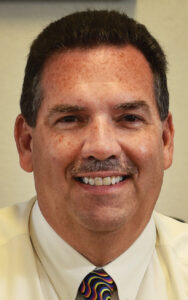Working with a broad cross-section of community leaders, Ector County ISD is making inroads to offer internet to families.
Called the Connector Task Force, the group was formed more than a year ago with community leaders in education, government, healthcare and the business community to look at the large-scale opportunity in Ector County.
They collected a lot of data that helped them fully understand the challenges that we face as a community and conducted a “landscape analysis” of what is happening with broadband in the country.

ECISD Superintendent Scott Muri said they also looked for bright spots of what different communities were doing that they might learn from.
The Dallas Federal Reserve became interested in what they were doing and identified Odessa as one of four communities that they cover that were exploring broadband access.
“… The Dallas Fed wanted to accelerate that work with us. They brought a broadband consulting firm to the table. This is really a company that designs broadband infrastructure for communities, cities, towns, across the country. And so we’ve been working with them, they helped us develop a model. It is a kind of a shovel-ready blueprint, if you will, of where we could put fiber optic cabling and wireless opportunities throughout Ector County that would ensure that almost everyone had access to high-speed broadband in our community. They also put together a business model and price tag with all of this,” Muri said.
He added that the business model the district shared recently with the City Council and county commissioners would allow the city and county to use their federal COVID recovery funds.
“… The project would, again, put fiber optic cabling throughout our community and then also leverage wireless technologies to ensure that almost everyone in the community had that kind of access. The package itself, there are three different versions of the business model. The version that provides the most coverage for our families would be an investment of about $35 million in infrastructure costs. However, over time, that revenue is brought in from those costs. And so the city and the county could, … in essence, invest in the infrastructure. And then internet service providers would use the infrastructure to sell their services to residents,” Muri said.
This would allow almost every family in Ector County to have access to internet service, he said.
“… I keep saying almost because we would still have some very remote parts of our community that would be reliant upon satellite to bring their solutions. So this is where the SpaceX Starlink satellites still comes into play in our community, because this infrastructure, just the expense of running it to some of the very remote parts of our community simply wouldn’t make sense when there is high-speed broadband available through satellite for some of these families and/or businesses, the oil and gas companies needs these opportunities,” Muri said.
“So we’ve shared this with the city and the county right now. We’re having more intimate conversations with them to make sure that they fully understand what this opportunity brings to bear,” he added.
The state legislature recently approved half a billion dollars to invest in broadband across the state and Brooks Landgraf, R-Odessa, was part of the conversations at the state level to ensure that money was made available throughout the state.
“We would be hopeful that our project would bring some of those dollars to Ector County. Again, through the city and through the county we would have access to those funds. In addition to that, the federal government is also looking at an infrastructure bill and part of that infrastructure bill is also money for broadband. … Right now, we have money sitting in our own community at the city and the county level, it’s federal money. We have the state that is going to use some of their federal money to support broadband. And then we have the federal government itself that is looking at another tranche of dollars, specifically focused on broadband. And so hopefully through one or more of those opportunities, we would be able to access the dollars needed to create this opportunity in Ector County,” Muri said.
The next step in the process is funding.
“… We’re working pretty diligently. In fact, (we) had a meeting just this morning (Oct. 25) about this very topic. We’re following up with both the city and the county to continue to engage in those conversations; also working with the state to kind of push on access to the new money that was just allocated at the state level. … But once the funding occurs, it’s about a year and a half to two years to actually build the infrastructure because you’re talking almost 800 miles of underground fiber optic cabling that’s going to be run throughout our community. It’s a lot of work and the sooner we can begin, the sooner families will have access to high-speed, affordable broadband,” Muri said.
He added that he is feeling optimistic about the prospect.
“There’s a lot of energy around this type of work right now. Certainly in our own community, a lot of the leaders fully understand why this is so critically important,” Muri said.
The district is expanding the number of families who can get access to the SpaceX Starlink satellite internet. A pilot program was started in Pleasant Farms.
Muri said ECISD is also working with SpaceX to explore going into more parts of Ector County.
“It would require them to launch more satellites, because the satellites that are right now orbiting our area, literally orbit Pleasant Farms, which I find fascinating … We’ve had a conversation with some folks at the state level that are interested in investing some additional state dollars in this adventure to significantly expanded across Ector County to provide many more families with this opportunity, so that the state could study it, better understand it, and then in the 2023 legislative session, have a great project in which the state legislature could fund and make more available to other parts of Texas, not just Ector County,” he said.
What the Connector Task Force has learned is that the more internet providers there are, the less expensive it will be.
“And that is all about demand of the customers … and the number of vendors that are, in this case, internet service providers, that sell their product. So the competition really drives the price down. And today in Ector County, some parts of our community have very few options, and so the price can be very high. But this infrastructure will bring many more internet service providers to bear and will allow us to have very reasonable costs for various members of our community,” Muri said.
He said cable companies and federal government also are providing ways for families to get internet.
“… For families that make less than a certain amount of money, they kind of fall within the poverty range, they have access to up to $50 a month in broadband service. In multiple parts of our community, $50 a month will buy high-speed broadband to the home. And so in essence that is free; the FCC pays up to $50 and if your bill is $50, then you’re getting free broadband. We’re sharing that information with families all over Ector County that qualify, so that is one way that families can get access. But you can only use those dollars if you live in a place that broadband exists. We still have some places in our community that don’t have, you know, the choice of the money is there but they don’t have options. So that is one way. We also last year raised quite a bit of philanthropic dollars to provide free internet access to families and we’re still using those dollars today for families that let us know that they’re in need. In addition to that, cable companies and other internet service providers have provided a level of service for about $10 a month. It’s a reduced level of service, so it’s not high speed, but it is broadband that’s made available at a very reasonable price to families. So families today have a variety of options that are available to them to have broadband within their home if you live in a place that has the infrastructure. If you don’t live in a place with that infrastructure, that’s when it becomes real difficult as a family. And that’s what the Connector Task Force is trying to solve. Let’s make sure that our entire county has access through an infrastructure to high-speed broadband. And then the money piece has been worked on by the federal government,” Muri said.
Areas that don’t have broadband infrastructure are mainly in Pleasant Farms, western Ector County and places in the northern part of Ector County.
“The city does have healthy infrastructure. The problem in the city is cost. And so the families that don’t have broadband and they live within city limits, it’s typically because it’s too expensive and they can’t afford it,” he said.




